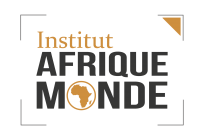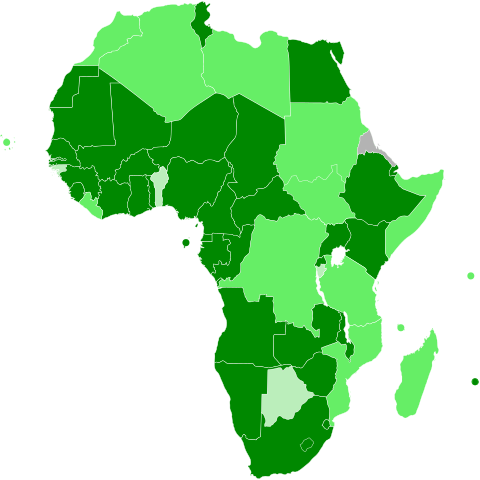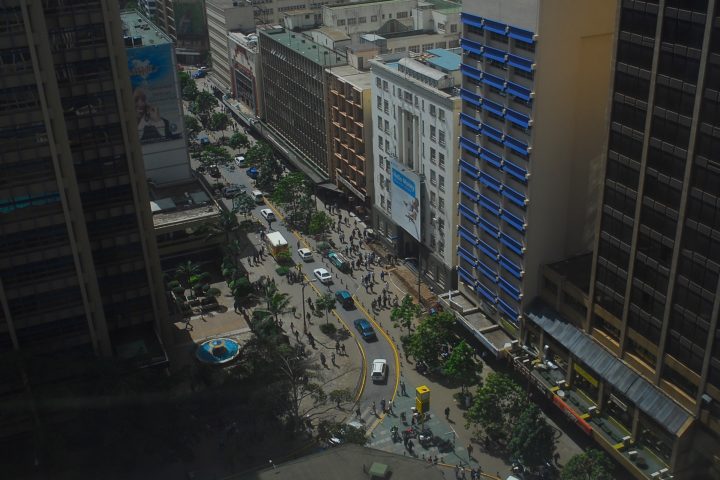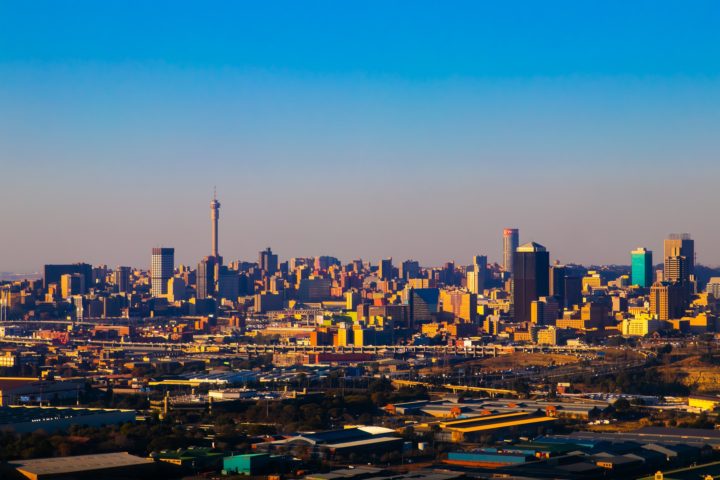The processes of globalization and internationalization, partly contained until the end of the 20th century by the bipolar nature of the world, have gained momentum and transformed the world economy. The evolution of the world since the late 1960s, when the AfDB was created, shows that the world at the beginning of the 21st century is very different from the one in which the AfDB was born.
The African Development Bank is a multilateral financial institution whose objective is to contribute to the sustainable economic development and social progress of its regional member countries (RMCs) individually or collectively. It mobilizes and allocates financial resources for investment and participates in development efforts by providing policy advice and technical assistance. Daughter of a very specific historical context, born of the experience and process of (de) colonization. It was at the time of its birth that the antagonisms between the Casablanca and Monrovia groups were most strongly expressed. The AfDB’s history, which began in 1964, has grown to include 54 regional member countries (RMCs) and 32 field offices across the continent. Since then, many changes have occurred that have affected both Africa and the world. Since its inception, the AfDB has undergone various phases of growth and reform aimed at constantly upgrading and adapting it to the changing situations and needs of its members. The AfDB has demonstrated remarkable resilience to the fundamental changes produced in the international system, as well as to the successive challenges to which it has been exposed and from which it has in fact emerged strengthened.
The regional members praise the AfDB, which they believe is highly efficient and reliable and whose ability to foster Africa’s economic emergence is valued by them. Non-regional members agree with this positive assessment. The AfDB’s good results, as well as its international credibility, seem to show that it is in a position to really do what it was created to do with all the resources it has at its disposal. It had to temporarily move its headquarters from Abidjan (since 1965) to Tunis in 2003, following political events in Côte d’Ivoire. It is therefore not without reason that it can now boast of having the confidence of the Member States.
1. Structure and strategic agenda
The African Development Bank Group (AfDB) is a multilateral and regional development financial institution that includes three entities: the African Development Bank, the African Development Fund (ADF) and the Nigeria Special Fund (NTF). The countries’ contributions to the AfDB and the ADF determine their number of shares, which in turn determines the importance of voting rights on the Board of Directors. The African Development Fund has become the AfDB’s largest lending window. It offers highly concessional loans (i.e. loans at very low interest rates with a long repayment period) and grants to low-income countries that are unable to borrow funds from the AfDB at market rates. Countries eligible for mixed financing may also borrow from the Fund.
The Board of Governors is the supreme body of the AfDB. It is the Bank’s most senior policymaking body. The Council shall include one representative from each of the Member States. The Board of Governors issues general guidelines on the Bank’s operations and approves amendments to the Agreement, the admission of new members and capital increases of the Bank. The AfDB Board of Governors elects a Board of Directors composed of 18 members. Twelve directors are elected by the RMCs and six by the RMCs for a three-year term, renewable once. The Board of Directors oversees all operations of the Bank.
The Board of Governors elects the AfDB President at an in camera session where only Governors and Alternate Governors of RMCs and PNBs are admitted. The presidential candidate must be nominated by the Governor of the RMP of which he or she is a national. He is elected for a five-year term, renewable once. The Board of Directors is responsible for the conduct of the bank’s general operations and, to this end, has the right to exercise all the powers of the AfDB, except those reserved exclusively for the Board of Governors. By its “African” character despite the significant presence of Western members, the AfDB stands out from the international financial institutions such as the World Bank and the International Monetary Fund, commonly perceived as the representatives of Western interests.
The AfDB President manages the daily operations of the AfDB under the direction of the Board of Directors. In this respect, it reports on the proper application of the policies and directives issued by the Board. In July 2006, the AfDB launched a major institutional reform to strengthen the effectiveness of its field operations and its outreach as a knowledge-sharing centre on Africa. In conducting the AfDB’s business, the President relies on a Chief Economist and 5 Vice-Presidents who oversee 30 departments, with 57 divisions and 6 organizational units. In fifty years, the AfDB has become a major development player. Its Annual Meetings provide an opportunity to review the institution’s operations over the past year and to review and approve future activities.
Today, the AfDB’s main mission is to transform Africa. Its “strategic agenda” has a triple objective: first, to create the conditions for “sustainable economic growth”, the second objective, “inclusive development” that benefits the greatest number of people; the third objective concerns “good governance”, a condition for sound and corruption-free management that allows for a fair distribution of the fruits of growth.
To achieve its “agenda”, the multilateral institution targets five operational priorities. First, to base its action on “private sector development”, which the Bank considers to be virtuous in relation to a public sector that is too often considered ineffective and more costly… Regional integration” is the second component of this approach, and is one of the most characteristic features of the AfDB’s development philosophy, following the development of infrastructure, technological skills and governance and responsibilities.
2. 2014: Annual meetings not like the others
The 49th session of the Annual Meetings (AA below) of the African Development Bank (AfDB) was held from May 19 to 23, in Kigali, the capital of Rwanda, in the presence of more than 3,000 guests, including such dignitaries as Ali Bongo Ondimba, Yoweri Museveni, Mohamed Ould Abdel Aziz, Macky Sall, William Samoel Ruto, Heads of State of Gabon, Uganda and Mauritania, Senegal and Vice President of Kenya respectively. There were also former Presidents Thabo Mbeki, Olusegun Obasanjo, Benjamin Mkapa, Festus Morgae of Botswana, the Chairperson of the African Union Commission, Ms. Dlamini NKosazana Zuma.
It brought together 78 countries – 53 African and 25 non-African – members of the African Development Bank within the framework of the Board of Governors of the Group, 74 international and regional organizations, the private sector, civil society organizations and eminent persons, who made significant contributions to the discussions. They are being held at a time when the AfDB is celebrating its 50th anniversary. It made it possible to assess the progress made in the implementation of the Action Plan adopted in 1964 in order to initiate further discussions on the emergence of Africa.
After five days of in-depth discussions on key development issues affecting Africa and the world, it appears that in 50 years, the AfDB has financed 910 agriculture and rural development projects (USD 13,001 million), 1,404 infrastructure projects (USD 45,455 million), 148 industrial projects in mines and quarries for a total of USD 4,875 million. The AfDB also financed 285 finance-related projects (USD 13,013 million), 681 social projects (USD 10,251 million), 3 urban development projects (USD 4.4 million).
The AfDB also invested in the environment with USD 365 million for 22 projects, multi-sectoral projects (USD 550 million) at a cost of USD 17,212 million and 498 other projects worth USD 14,512. According to a 2014 Bank report, for the next 50 years, the AfDB dreams of a prosperous continent based on sustainable inclusive and environmental growth, an integrated continent based on unity and pan-Africanism.
The AfDB also hopes that Africa will become a continent characterized by good governance, democracy, respect for human rights and the rule of law. A peaceful and secure continent with a strong cultural identity, a strong and influential global partnership. The AfDB’s action for the next 50 years is summarized in the Africa 50 project based on the delivery of transformational infrastructure.
3. General summary: 50 years of Africa we want
Since its inception, the AfDB has served as a common framework for continental action and cooperation on economic and social development. At 50 years of existence, it calls for an integrated policy approach to ensure inclusive economic and social development as part of a development agenda that meets the aspirations of all African peoples. Far from being a fashionable slogan, the “Africa we want”, the theme under which A.A. Kigali was placed aims to shape a prosperous Africa or at least give conceptual content to this slogan.
The various informal documents and official reports that framed the discussions on the future of Africa sought to focus the debate on transformation taking into account the change in the international financial architecture, with the rise of BRICS and the improvement of FDI flows. The Annual Meetings were preceded by meetings of the subsidiary bodies of the Board of Governors, financial presentation, ADF consultations, high-level seminars on various topics. The future of Africa traced out in Kigali is attested by the choice of subjects dealt with, a willingness to address current and future themes, without ever losing sight of the unbreakable link between the past and the future.
A.A. highlighted the AfDB’s contributions to Africa’s development over the past fifty years and stressed how important this initiative has been in mobilizing the international community’s interest and commitment to the continent’s development or in broadening the action of international partners in support of African initiatives to alleviate poverty and accelerate economic growth.
A.A. noted that many African countries have experienced steady improvements in recent years in the consolidation of peace, good governance, economic growth and social development. The continent’s economic growth rate has improved significantly, from 3% in 1999 to 5.3% in 2006 and is expected to have reached 5.9% in 2007. Sound economic policy has in many cases led to improved levels of trade and investment.
A.A. has assessed the opportunities that current growth offers to make tangible and significant progress towards achieving the MDGs and has stressed the importance of a participatory approach and the exchange of good practices. Inclusive growth is broadly in line with the MDGs, which are clear, time-bound goals for development priorities that have been agreed by the international community. It was generally agreed and recognized that political leadership, a multisectoral approach and additional international and national resources will be needed to achieve the MDGs. Many participants also stressed the need for a more results-oriented approach and the need to create an African-owned system for assessing economic performance.
Education is the cornerstone of development. The acquisition of knowledge and skills through education opens up the world and improves its future prospects. In addition, building people’s capacities promotes poverty reduction, economic growth and scientific and technological development. In addition, the promotion of mutual understanding between all religions and ethnic groups is essential for stability and peace in the world, and education also plays an important role in this regard. Nevertheless, developing countries still face many problems in terms of the quantity and quality of education.
A.A. stressed the need for African countries to increase access to basic education while simultaneously improving the quality of education, in order to achieve Education for All and MDG 2, and to have the human resources necessary for sustainable socio-economic growth and development. She stressed the importance of gender parity in this regard. School construction/renovation, human resources and access to sufficient and adequate educational tools were cited by participants as the main challenges to improving basic education in Africa, especially in rural areas.
Higher education should play a central role in each country in responding to the need to establish a knowledge-based society, in particular by creating knowledge and innovation (research), training human resources that stimulate socio-economic development (education), solving development problems that are of increasing complexity with the continued globalization of the economy and society, and returning benefits to industry and society (social contribution), while focusing on the post-World Development Organization period.
A.A. has emphasized the critical importance of the private sector for growth, including diversifying the economy and making key investments that will ensure sustained growth. Better public-private partnerships are desirable to build trust and increase domestic and international private investment.
For A.A., participation in global value chains is essential to Africa’s transformation. By participating more effectively in the global production of goods and services, Africa can transform its economy and achieve a breakthrough in terms of development, according to the African Economic Outlook, published on 19 May at the Annual Meetings of the African Development Bank Group. “In order to support economic growth and ensure that it creates opportunities for all, African countries must continue to rebuild shock absorbers and implement prudent macro-management. Any relaxation in macro-management will harm future economic growth,” said Mthuli Ncube, Chief Economist and Vice President of the African Development Bank.
A.A. noted that African agricultural sector growth and rural reforms are essential for economic growth and food security and can contribute to poverty reduction. With more than two thirds of Africans living in rural areas and relying on agriculture for their income and livelihoods, this sector is vital for economic growth. Africa is estimated to have more than half of the world’s arable land, but due to lack of infrastructure, farmers may lose more than half of their production before they can sell it.
In this regard, the importance of south-south and triangular processing and cooperation, technology transfers for the production of better seeds, financial assistance for the purchase of fertilizers and the creation of farmers’ groups were mentioned. According to this year’s Africa Progress Panel report, entitled “Agriculture, Fisheries and Capital: Financing Africa’s Green and Blue Revolutions”, Africa has the potential not only to feed itself, but also to feed other regions. The report notes that African countries can reduce poverty and inequality by stimulating agriculture. There is significant potential in the agricultural sector which, if exploited, could create jobs.
Youth employment: African youth are generally portrayed as inactive participants in government action and passive recipients of development assistance Across Africa, young people are becoming aware of the demands of their time, embracing the latest technologies to push the boundaries of production and mobilizing resources to create opportunities for themselves and others. Although most of their actions seem to be random, they are taking steps to stimulate change in the political, economic and social spheres. What these young emerging people need is structured support. By 2025, in most African countries, the middle class will have become the majority, which is already fuelling the appetite of some investors seeking consumer markets.
A.A. highlighted the significant progress Africa has made in advancing peacebuilding in recent years. Participants noted that this positive trend, which is the foundation of development, should be reinforced. They recognized the importance of ensuring that the peace dividend reaches the entire population. The conference stressed the need to provide unfailing support for a wide range of peacebuilding measures from the early stages of post-conflict reconstruction. In order to achieve peace and sustainable development, active conflict prevention would be more effective than a simple reaction to ongoing conflicts. In particular, participants recommended a comprehensive approach to conflict prevention by African countries and the international community.
Foreign investment over the past decade has been six times higher than in the previous decade and trade relations with emerging economic powers such as China, India and Brazil are expanding rapidly. The global economy has contributed to a reassessment of the place and role of foreign direct investment (FDI) in national economies. For a long time, States’ behaviour towards FDI has been changing, sometimes suspected of jeopardizing national independence, sometimes expected to solve employment problems. Today, the change in attitude of the governments of the various countries, both North and South, has resulted in more liberal policies towards FDI and multinational firms. In this sense, increasing attractiveness has become an explicit economic policy objective in both developed and developing countries. Foreign investment in Africa has grown remarkably in recent years.
These flows increased from $14 billion in 2002 to $67 billion in 2012. This shows a certain interest especially if we take into account the financial crisis of 2008. Foreign private capital flows now exceed official development assistance. Aid increased from $18 billion to $43 billion over this period. In terms of growth rates, capital flows have increased by almost 20 percent per year compared to 12 percent for aid. This growth in capital flows is partly driven by China and the other BRICS member countries (Brazil, Russia, China, India and South Africa). These countries now account for more than a quarter of capital flows to the continent and this trend is on the rise.
Governance: The conference welcomed the progress made in improving governance in many African countries. She considered the African Peer Review Mechanism, an AU/NEPAD initiative, a success. She commended UNDP for its significant support to this initiative. Participants continue to give priority to building the capacity of the executive, legislative and judicial branches as well as public administrations and electoral institutions.
The AfDB’s vision is of an “Africa governed by transparent, accountable and competent governments and strong institutions capable of stimulating inclusive and sustainable growth”. But, in the meantime, bottlenecks, not the least of which, are holding back the continent’s development.
4. Some decisions taken
The Governors commended the Bank’s management and staff for the many innovative policies, initiatives and activities implemented over the past year. They also stressed the importance of strategic leadership in addressing the challenges facing the continent in realizing the dreams of its peoples. The Governors approved the Bank’s major initiatives, its 2013 Annual Report and audited accounts, as well as its future operations and programs.
These challenges can be addressed through economic integration and conflict resolution, as suggested by the governors. They decided to reduce material and non-material barriers to economic integration, and pledged to work with the private sector to promote productive employment.
Stressing the importance of gender equality as a cornerstone of inclusive growth, the Governors strongly encouraged the Bank to fully implement its Gender Equality Strategy in its national, regional and sectoral budgeting and programming activities. Participants recognized the importance of civil society and encouraged it to take an active part in the AfDB’s activities.
Ecobank Transnational Incorporated, the leading independent pan-African regional banking group operating in 35 African countries, has secured a $200 million trade finance facility. TMB elected Best Bank in Central Africa KIGALI. Banque Populaire elected best bank in North Africa.
The upheavals that have occurred on the international scene in recent decades, the widening priority gap between Africa and Europe, each of which has seen an increase in the number of its members, the animosity created by the length of negotiations for Economic Partnership Agreements and the inaction on more regional approaches may combine to form an insurmountable barrier to the pursuit of a partnership born of a world that has now disappeared.
The upheavals that have occurred on the international scene in recent decades, the widening priority gap between Africa and Europe, each of which has seen an increase in the number of its members, the animosity created by the length of negotiations for Economic Partnership Agreements and the inaction on more regional approaches may combine to form an insurmountable barrier to the pursuit of a partnership born of a world that has now disappeared.
Download the full note in pdf format



